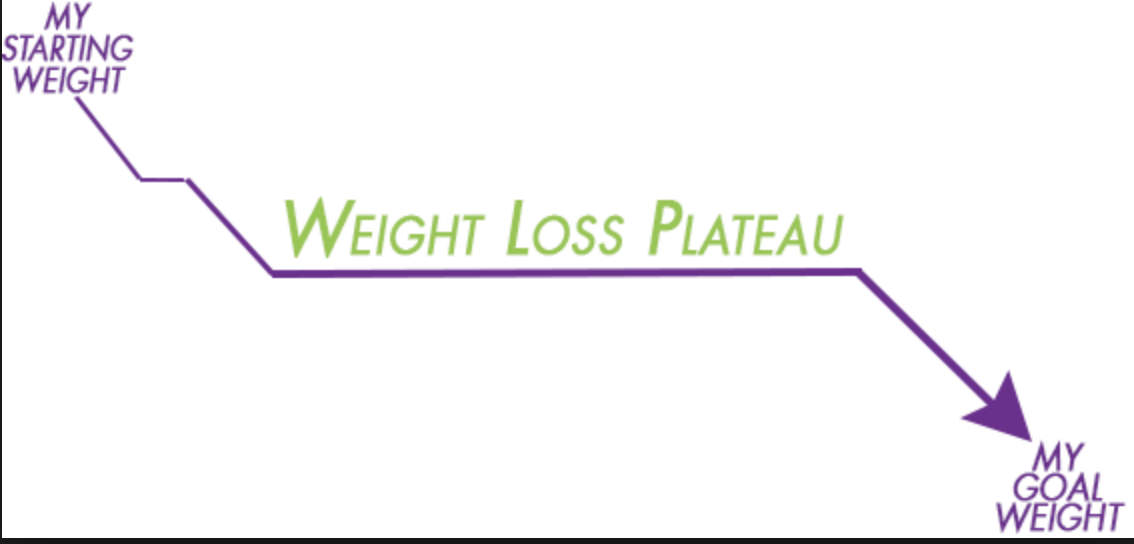Stick With It When On A Plateau
When you start eating healthier food or start a new diet, your body responds initially by quickly dropping weight. But over time your body adjusts and you reach a plateau. This is when you are still eating healthier food or less food and your body holds or plateaus. You don't gain weight, but you don't lose either. This can be very discouraging. But there is help and a way to deal with it.The change is because you have a hormone imbalance and have affected your body's glycogen level, which throws off your natural base point. Glycogen is a type of carbohydrate found in the muscles and liver. Yes, this post is going to involve science again. But it is also going to involve ways tips!The solution is NOT to eat less and work out more. The body is not a bank account, it’s a chemistry set. Rather than worry about calories in versus calories out, the key is to calm the body and get it back into balance. Here are a few tricks for doing just that.SleepIf you are not getting enough rest, you are continually stressing the body, and there is no way you will break through a plateau when you aren't sleeping well. The solution is to shoot for a good eight hours nightly.Do you ever have the experience of eating a lot on vacation but not gaining weight? This is because you are sleeping more and are less stressed out. It isn't because the food is healthier in the new place. This happens to me every time I go on vacation, even if the vacation isn't free of stress. The reason is that I stop exercising. Yes, that's right. I stop stressing out my body by being so demanding and lose weight. Weird, right!StillnessEven if it's just for a few minutes each day. Make the time to be still. Activate your Vagus Nerve or Unitask.BreakfastYour body fasts overnight, so eating within 45 minutes of waking keeps it from going into preservation mode—a cycle in which it wants to store fat. Make sure to include protein, whether it is vegan or not. Please do not eat anything too sugary. Protein with breakfast feeds hungry muscle from the overnight fast, it strengthens the immune system and it stabilizes blood sugar for consistent energy to start the day.WeightsDon’t be afraid to use weights. This includes your own body weight. I personally don't use anything but my own body weight by doing lunges, burgees and plank. Muscle burns more calories than fat, so increasing lean muscle mass will ultimately help you lose inches. Aim for a minimum of 20 minutes to stimulate testosterone production and lean muscle increase.Water!Thirst often makes us think we are hungry. You need to be consistently drinking water during the day to stay hydrated. I do this by drinking some water after each time I have to urinate. Relying on meal times for most of your hydration actually dilutes digestive enzymes and interferes with proper digestion. The trick is to drink a half-ounce of water per pound of body weight each day and get it by sipping throughout the day, not gulping. Try to avoid drinking at least 1.5 hours before bedtime to alleviate the need to get up in the middle of the night.ExerciseIncrease your daily energy output by taking the stairs, parking further away from the entrance, walking all can help. Most people should exercise 30 minutes a day, nearly every day of the week. But people trying to lose weight should exercise more often than that or increase the intensity.Stop snackingI found a way to break this habit by adopting a rigorous dental hygiene practice. After each time I eat, I brush my teeth softly for 2 minutes, floss and scrape my tongue. I actually this stuff around with me to do this when out. After doing this my mouth feels so clean I don't want to mess it up by eating or drinking something other than water.Snacking frequently can stimulate too much insulin in the body, which can signal the storage of fat. Most people do better with three solid meals and one healthy snack (almonds, 100% chocolate, avocado) in the afternoon. It’s also easier to maintain portion control when you’re not snacking all day long. Be sure to focus on lean protein, vegetables and healthy fats. One cup of broccoli contains 11 grams of protein. Yes, that's right. BROCCOLI!These are just a few tips. If you want more information, please reach out for a weight loss consultation.If you want to lose weight and keep it off, you cannot focus on calories, you have to teach the body how to gently and efficiently burn fat. That means nourishing it with the right foods at the right times, and exercising smartly—not just for a long time. Reducing stress and maintaining balance in your eating and exercise will keep you on the road to steady results.Whatever you do, do not give up and go back to your old eating and exercise habits. That will result in your regaining all of the weight you've lost. Celebrate your successes and continue your efforts to continue your weight loss journey.Please share your experiences. We can all learn from each other.







